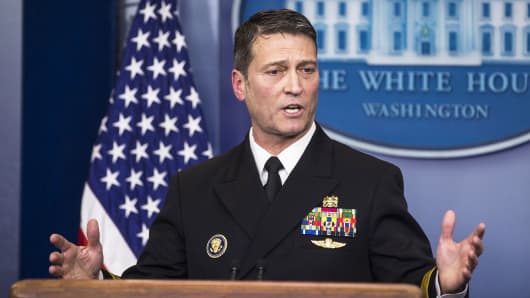The White House released a brief biography of Jackson. Highlights include:
– Qualifications in submarine and hyperbaric medicine
– Experience as a diving medical officer in an explosive ordnance disposal mobile unit and work diving safety officer
– Emergency medicine physician in the Iraq War
– Also served as White House physician for Presidents George W. Bush and Barack Obama. He has also directed health care for the Cabinet and Trump's senior staff, and acted as physician to the White House and served as director of the White House Medical Unit.
– Awards include: the Defense Superior Service Medal, the Legion of Merit, the Navy/Marine Corps Commendation Medal (four awards), the Navy/Marine Corps Achievement Medal (three awards), among others.
While Augustine, of the group Disabled American Veterans, noted that this is not the first time a secretary has been picked from outside the department, he said the VA's next leader has to "have some kind of institutional knowledge about the organization in order to make educated decisions."
Joe Plenzler, director of media relations of the American Legion National Headquarters, echoed the sentiment.
"The Department of Veterans Affairs is our nation's largest integrated health care system and the second largest federal department, and the Secretary of the VA is a position that requires experience and proficiency at running large health care systems," he said in an emailed statement to CNBC. "Ultimately, we will work with whomever the U.S. Senate approves for the position to ensure our nation's veterans receive the care they deserve."
However, experience running a massive organization is key to bringing the VA back to health. The institution in recent years has been crippled by inefficiencies and scandals over the services it provides to its military patients.
"The VA is more than just health care, you're talking about compensation, you're talking about education, you're talking about insurance, cemeteries, I could go on and on. So, whoever comes in as a leader needs to be cognizant of all facets of the VA system," Augustine said.




